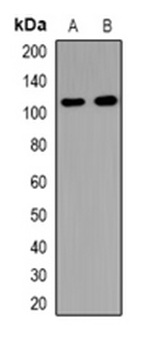Anti-USP37 Antibody
Rabbit Polyclonal antibody
- SPECIFICATION
- CITATIONS
- PROTOCOLS
- BACKGROUND

Application
| WB |
|---|---|
| Primary Accession | Q86T82 |
| Reactivity | Human, Mouse, Rat |
| Host | Rabbit |
| Clonality | Polyclonal |
| Isotype | Rabbit IgG |
| Calculated MW | 110170 Da |
| Gene ID | 57695 |
|---|---|
| Positive Control | WB: HeLa, mouse brain, rat brain lystes |
| Application & Usage | WB; 1:500 – 1:2000 |
| Alias Symbol | USP37 |
| Other Names | KIAA1594, Ubiquitin carboxyl-terminal hydrolase 37, Deubiquitinating enzyme 37, Ubiquitin thioesterase 37, Ubiquitin-specific-processing protease 37 |
| Formulation | In 0.42% Potassium phosphate; 0.87% Sodium chloride; pH 7.3; 30% glycerol and 0.01% sodium azide |
| Reconstitution & Storage | 12 months under -20°C |
| Background Descriptions | |
| Precautions | Anti-USP37 Antibody is for research use only and not for use in diagnostic or therapeutic procedures. |
| Name | USP37 |
|---|---|
| Synonyms | KIAA1594 |
| Function | Deubiquitinase that plays a role in different processes including cell cycle regulation, DNA replication or DNA damage response (PubMed:26299517, PubMed:27296872, PubMed:31911859, PubMed:34509474). Antagonizes the anaphase-promoting complex (APC/C) during G1/S transition by mediating deubiquitination of cyclin-A (CCNA1 and CCNA2), thereby promoting S phase entry. Specifically mediates deubiquitination of 'Lys-11'-linked polyubiquitin chains, a specific ubiquitin-linkage type mediated by the APC/C complex. Phosphorylation at Ser-628 during G1/S phase maximizes the deubiquitinase activity, leading to prevent degradation of cyclin-A (CCNA1 and CCNA2) (PubMed:21596315). Plays an important role in the regulation of DNA replication by stabilizing the licensing factor CDT1 (PubMed:27296872). Plays also an essential role beyond S-phase entry to promote the efficiency and fidelity of replication by deubiquitinating checkpoint kinase 1/CHK1, promoting its stability (PubMed:34509474). Sustains the DNA damage response (DDR) by deubiquitinating and stabilizing the ATP-dependent DNA helicase BLM (PubMed:34606619). Mechanistically, DNA double-strand breaks (DSB) promotes ATM-mediated phosphorylation of USP37 and enhances the binding between USP37 and BLM (PubMed:34606619). Promotes cell migration by deubiquitinating and stabilizing the epithelial-mesenchymal transition (EMT)-inducing transcription factor SNAI (PubMed:31911859). Plays a role in the regulation of mitotic spindle assembly and mitotic progression by associating with chromatin-associated WAPL and stabilizing it through deubiquitination (PubMed:26299517). |
| Cellular Location | Nucleus. Chromosome |
| Tissue Location | Expressed in brain and prostate. |

Thousands of laboratories across the world have published research that depended on the performance of antibodies from Abcepta to advance their research. Check out links to articles that cite our products in major peer-reviewed journals, organized by research category.
info@abcepta.com, and receive a free "I Love Antibodies" mug.
Provided below are standard protocols that you may find useful for product applications.
Background
Deubiquitinase that antagonizes the anaphase-promoting complex (APC/C) during G1/S transition by mediating deubiquitination of cyclin-A (CCNA1 and CCNA2), thereby promoting S phase entry. Specifically mediates deubiquitination of 'Lys-11'-linked polyubiquitin chains, a specific ubiquitin-linkage type mediated by the APC/C complex. Also mediates deubiquitination of 'Lys-48'-linked polyubiquitin chains in vitro. Phosphorylation at Ser-628 during G1/S phase maximizes the deubiquitinase activity, leading to prevent degradation of cyclin-A (CCNA1 and CCNA2).
If you have used an Abcepta product and would like to share how it has performed, please click on the "Submit Review" button and provide the requested information. Our staff will examine and post your review and contact you if needed.
If you have any additional inquiries please email technical services at tech@abcepta.com.













 Foundational characteristics of cancer include proliferation, angiogenesis, migration, evasion of apoptosis, and cellular immortality. Find key markers for these cellular processes and antibodies to detect them.
Foundational characteristics of cancer include proliferation, angiogenesis, migration, evasion of apoptosis, and cellular immortality. Find key markers for these cellular processes and antibodies to detect them. The SUMOplot™ Analysis Program predicts and scores sumoylation sites in your protein. SUMOylation is a post-translational modification involved in various cellular processes, such as nuclear-cytosolic transport, transcriptional regulation, apoptosis, protein stability, response to stress, and progression through the cell cycle.
The SUMOplot™ Analysis Program predicts and scores sumoylation sites in your protein. SUMOylation is a post-translational modification involved in various cellular processes, such as nuclear-cytosolic transport, transcriptional regulation, apoptosis, protein stability, response to stress, and progression through the cell cycle. The Autophagy Receptor Motif Plotter predicts and scores autophagy receptor binding sites in your protein. Identifying proteins connected to this pathway is critical to understanding the role of autophagy in physiological as well as pathological processes such as development, differentiation, neurodegenerative diseases, stress, infection, and cancer.
The Autophagy Receptor Motif Plotter predicts and scores autophagy receptor binding sites in your protein. Identifying proteins connected to this pathway is critical to understanding the role of autophagy in physiological as well as pathological processes such as development, differentiation, neurodegenerative diseases, stress, infection, and cancer.


